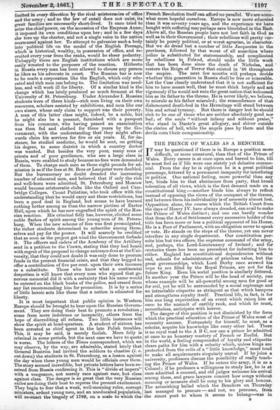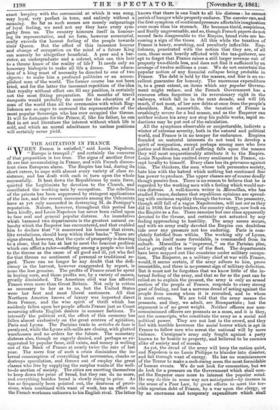THE PRINCE OF WALES AS A BENCHER.
IT may be questioned if there is in Europe a position more difficult, or more unnatural, than that of the Prince of Wales. Every career is at once open and barred to him, till he must feel as if life were one stately yet delusive ceremo- nial. From the day he is eighteen he is a great political personage, fettered by a permanent incapacity for interfering in politics. One national feeling, more powerful than any law, binds him to that abstinence from party, that broad toleration of all views, which is the first demand made on a constitutional king :—another binds him always to reflect instead of opposing the views of the occupant of the throne, and between them his individuality is of necessity almost lost. Opposition alone, the course which the British Court from the days of Henry IV. have always dreaded, can avail to make the Prince of Wales distinct; and one can hardly wonder that from the Act of Settlement every successive holder of the title has been more or less a political opponent of his House. He is a Peer of Parliament, with an obligation never to speak or vote. He stands on the steps of the throne, yet can never interfere in any single department. Our constitution per- mits him but two offices, the giupreme command of the-army, and, perhaps, the Lord-Lieutenancy of Ireland ; and for centuries there has been no precedent for inducting him to either. England has constitutional dependencies without end, schools for administrators of priceless value, but the great governorships, which Lord Derby once avowed his hope to see filled by the Royal Princes, are not for the future King. Even his social position is similarly fettered. In another year the Prince will be the head of society, one whose example will be all-powerful among men for good or for evil, yet he will be surrounded by a social espionage and an intractable etiquette as stringent as that which hampers and strengthens royalty- itself. Practical life, in fact, is for him one long expectation of an event which raisee him at once to the summit of earthly rank, and which he must, nevertheless, anticipate with horror. The danger of this position is not diminished by the form which the practical education of the Prince of Wales must of necessity assume. Fortunately for himself, he must, as a scholar, acquire his knowledge like every other lad. There is no royal road to the A B C, nor can a prince be admitted at once to an honorary mastery of French or Euclid. But in the world, a feeling compounded of loyalty and etiquette clears paths for him with a celerity which, unless kings are protected from the evils of a " little knowledge," must tend to make all acquirements singularly unreal. If he joins a university, professors discuss the possibility of really teach- ing the Prince of Wales. If he enters the army, it is as a Colonel ; if he professes a willingness to study law, he is at once admitted a counsel, and old judges welcome his arrival among them, and grave lawyers concert how songs without meaning or measure shall be sung to his glory and honour. The astonishing ballad which the Benchers on Thursday last managed to procure and not, we presume, from the street poet to whom it seems to belong—was in exact keeping with the ceremonial at which it was sung, very loyal, very perfect in tone, and entirely without a meaning. So far as such scenes are merely outpourings of loyal feeling, we need not say they have every sym- pathy from us. The country honours itself in honour- ing its representative, and no form, however reverential, really exceeds the honest feeling of the people towards their Queen. But the effect of this incessant honour and change of occupation on the mind of a future King can scarcely be altogether beneficial. A peer and a bar- rister, an undergraduate and a colonel, what can this heir to a throne know of the reality of life ? It needs only an honorary bishopric to make all life a dream. The educa- tion of a king must of necessity be directed to one of two objects : to make him a profound politician or an accom- plished man of the world. The former course has not been tried, and for the latter the incessant repetition of the idea that royalty without effort can fill any position, is certainly not the most fitting preparation. Six months of travel incognito would probably do more for the education of a man of the world than all the ceremonies with which Eng- lishmen are so eager to surround the representative of the most popular Sovereign who has ever occupied the 'throne. It will be fortunate for the Prince, if, like his father, he can find in art and literature the interest without which life is cold, and which an unreal admittance to useless positions will certainly never yield.































 Previous page
Previous page